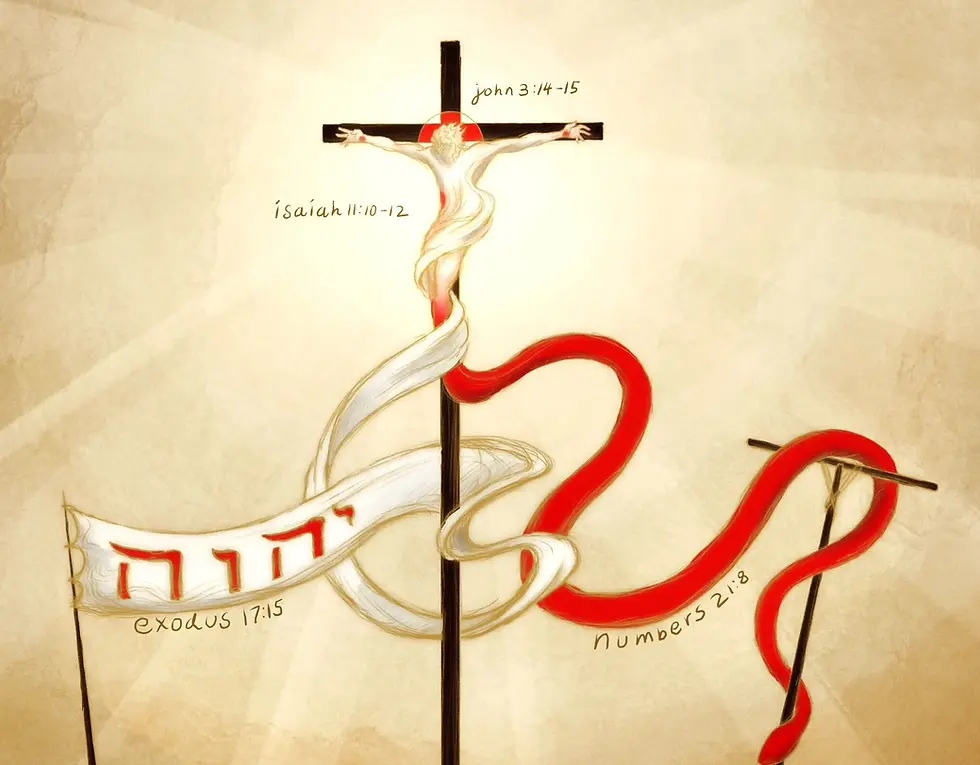PANS, CAESARS AND THE MESSIAH
- Charles
- 26 août 2023
- 4 min de lecture
Reflection for the Twenty-first Sunday in Ordinary Time: Isaiah 22:19-23, Romans 11:33-36, & Matthew 16:13-20

“Who do you say that I am?” is a question that has probed the hearts of mystics and common folk alike for generations. This question gains even more significance when one considers where Jesus chooses to ask it. The Gospel says, “Jesus went into the region of Caesarea Philippi”. Formerly known as Panias, this 2200-year-old city, is now named Banias/Banyas and is located in Syria/Israel (depending on your side of the debate). It is interesting that Jesus should choose to pose the question about his ‘identity’ here in Caesarea Philippi for this region was home to two famous temples dedicated to two of the greatest symbols of power in Ancient times: the Greek God of Pan and the Roman King Augustus Caesar.

Known in the Old Testament period as Baal Hermon for its status as one of the popular centres of Baal worship, this region later became the centre of the Greek fertility god known as Pan (hence the name Panias). The caves of the region were considered gateways to the underworld, through which gods passed to the earth. Ancient Greek tragedies depict these gods as victors, powerful and mighty, who treated human beings like toys. It is argued that Shakespeare was referring to these gods when he wrote in his famous play King Lear (Act IV, Scene 1), “As flies to wanton boys are we to the gods; They kill us for their sport”.
After the Romans took over the region of Panias, King Herod built three temples here (Augusteums) in honour of Emperor Augustus Caesar who allotted the land to him. Later King Philip, also seeking to honour Augustus, renamed the region “Caesarea Philippi” (that is, Caesarea of Philip). Because Julius Caesar was called the ‘divine Julius’ (divus Iulius), his son Augustus Caesar became the divi Iuli filius, the ‘son of the divine Julius’ and therefore also ‘the son of God’. As the “gospel of Augustus Caesar” (Pax Romana) that existed in the Roman Empire before any of our four gospels notes, the birthday of Augustus was celebrated as “good news” throughout the empire and also the beginning of the new year. Thus, Caesarea Philippi evoked two great symbols of power: the mighty god Pan, so powerful that he treats human beings like flies and toys and kills them for sport; and the brutal king Augustus Caesar, the “Son of God”, who demands fear, servitude, and obedience from his subjects.

It is at Caesarea Philippi, standing in front of the grotto of Pan and the temple of Augustus Caesar in the background, that Peter proclaims the Church's"Good News" acclaiming, “You are the Messiah, the Son of the living God”. A Jewish carpenter turned preacher, who had no army of his own, no kingdom after his name, no temple or no grotto dedicated in his honour is proclaimed to be the Messiah in the very city of the two most powerful symbols of ancient world. Jesus tells Peter, “On this rock, I will build my church”. What is this rock? Is it Peter (because Petra means rock)?
There are three different interpretations: Firstly there are many scholars who claim that this rock is Peter himself. “You are Peter (Petros) and on this rock (Petra) I will build my church.” Secondly, there are also biblists who say that the rock is not Peter but the identity of Jesus as the Messiah and the Son of the living God, which is the sure foundation of the Church. Thirdly, there are also scholars who interpret that the rock does not refer to Peter but to Peter’s confession of faith: “You are the Messiah, the son of the living God.” It is this same faith that he has received from God that shall become the rock on which he is going to build His Church. It is the Father’s “revelation” of Jesus’ identity as the true Messiah and the Son of God received as Good News and proclaimed by Peter that becomes the “rock on which the Church is built”.

Our contemporary societies are plagued with numerous Pans and Caesars, who treat humans like flies and demand fear, power, and servitude by projecting themselves as messiahs and the sons of God. As the 2022 report of V-Dem (Varieties of Democracy Institute) asserts, 2021 has witnessed the lowest levels of democracy the world has seen in thirty years. ‘Autocratization’ continues to adapt and evolve, marked by the growing use of polarization as a political strategy, the continuing rise of misinformation, and the surge in military coups. Pans and Caesars are rampant in our Churches, families, and neighbourhoods. Don’t we enjoy wielding our power to portray a bigger-than-life image of ourselves? Don’t we measure our value by the ‘influence’ that we command and the ‘control’ that we exercise over others?
In this background, the gospel extends a three-fold invitation:
1. Reject the Pans and Caesars of our society and Church by defying their false messianic self-perceptions and projections;
2. Proclaim the model of the one true Messiah and Son of God, whose power does not enslave but liberates, whose reign does not divide but creates communion, and whose ‘influence’ does not limit our freedom but renders it possible;
3. Continue the project of building the Church by creating alternative models of community living where love is valued more than power, life is affirmed more than violence, unity is validated than divisive politics, and justice is prioritised more than the personal self-interests of our contemporary society’s Pans and Caesars.
May the Pans and Caesars of our societies, Churches, families, communities, and institutions give way to the one true Messiah who is the Lord of life, love, and justice.




Commentaires